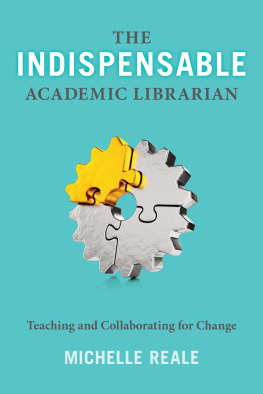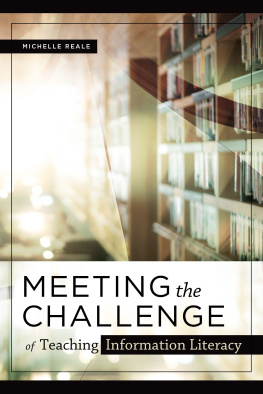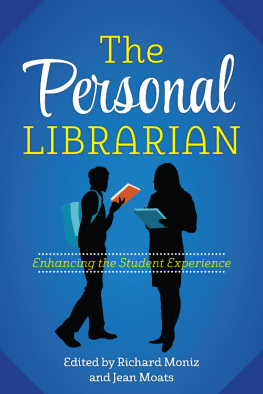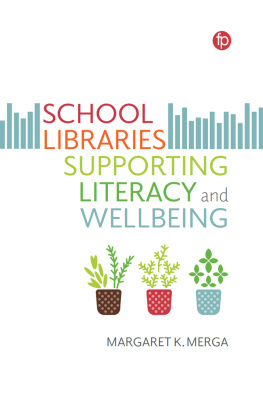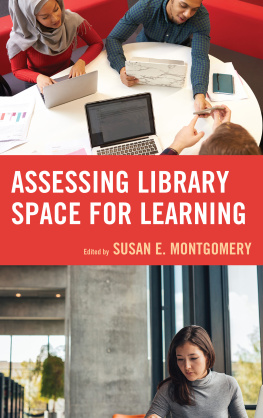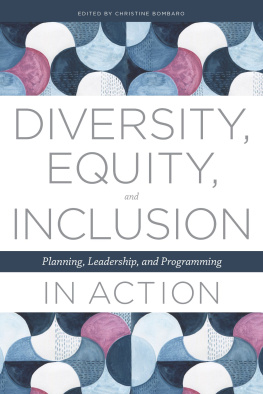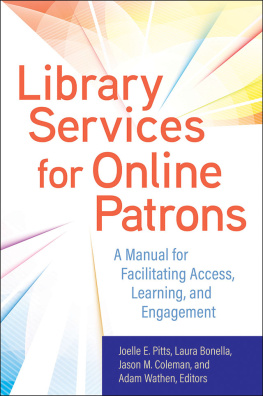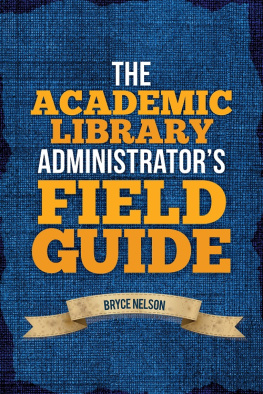
ALA Editions purchases fund advocacy, awareness, and accreditation programs for library professionals worldwide.
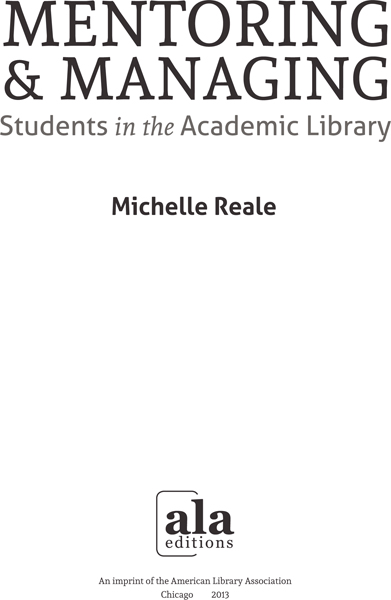
Michelle Reale is the access services and outreach librarian at Landman Library, Arcadia University, located in the suburbs of Philadelphia.
2013 by the American Library Association. Any claim of copyright is subject to applicable limitations and exceptions, such as rights of fair use and library copying pursuant to Sections 107 and 108 of the U.S. Copyright Act. No copyright is claimed for content in the public domain, such as works of the U.S. government.
Extensive effort has gone into ensuring the reliability of the information in this book; however, the publisher makes no warranty, express or implied, with respect to the material contained herein.
ISBNs: 978-0-8389-1174-7 (paper); 978-0-8389-9620-1 (PDF); 978-0-8389-9676-8 (ePub); 978-0-8389-9677-5 (Kindle). For more information on digital formats, visit the ALA Store at alastore.ala.org and select eEditions.
Library of Congress Cataloging-in-Publication Data
Reale, Michelle.
Mentoring and managing students in the academic library / Michelle Reale.
pages cm
Includes bibliographical references and .
ISBN 978-0-8389-1174-7
1. Student library assistants. 2. Academic librariesPersonnel management. I. Title.
Z682.4.S89R43 2012
023'.3dc23
2012027377
Cover design by Adrianna Sutton. Cover image Yuri Arcurs/Shutterstock, Inc.
Dedicated to my parents, Russell and Dorothy Messina, by far my first and best mentors
To Dr. Jeanne Buckley with immense gratitude for consistently and gently showing me the way
To Mary Gillis and Francine Sabino for such fine attention to detail
To Erin Bruno for summing it up in a way that only she could
Contents
THE ACTUAL ORIGIN of mentoring as a practice has roots in Greek mythology. When Odysseus left to fight in the Trojan War, he placed his son Telemachus in the care of his most trusted friend, Mentor. In young adulthood, the goddess Athena assumed Mentors identity as Telemachus went in search of his father. What began as a seemingly masculine tradition now knows no gender limits, though some of the literature would suggest that men prefer to be mentored by men and women by women.
Now, mentoring is a common and increasingly growing practice in nearly every profession, though the concept of mentoring will mean different things to different people in different contexts. At its very basic definition, mentoring is a close relationship between, let us say for claritys sake, someone who seeks guidance and one who is in the position, by intellect, temperament, and experience, to be able to provide it.
A Personal Approach
The idea of writing this book came out of the many experiences I have had over the past seven years working closely with students at the suburban university where I am a faculty librarian. Because our library employs so many federally funded work-study students in order to run smoothly and offer the liberal open hours that the campus community enjoys, it is in our interest to hire the best students that we can, train them well, and teach them something along the way about how to be in the work world, while also encouraging their own career goals whatever they may be.
While all of this seems such an obvious approachindeed, isnt all of the above what we should be doing, anyway?the day-to-day responsibilities of most librarians in the university setting do not allow for the time it will often take to really work with a student who may be shy, reluctant, bored, or simply uninterested in the job at hand. Not every student who gets placed at the library wants to be there. In fact, with a few very strong exceptions, most of the students who may approach you at the beginning of any given semester, their work placement in hand, probably did not want to work in the library; it was simply the luck of the draw. Stereotypes being what they are (i.e., fierce and persistent), to many students, especially those fresh from high school, the atmosphere of a library is believed to be one of stagnant, mind-numbing boredom, to say nothing of the negative image held firmly in their minds of the librarians who work there.
As for the librarians point of view, the time it takes to train a student in all of the various aspects of technology and customer service will send up a collective sigh among most of us in the profession. It is a difficult task, at best, to give consistent and even service with a group of students for whom work is not their first priority. We understand this, though, at the outset, and work toward our goals anyway. Our students are extremely valuable commodities in our libraries, a great boon to the functioning of the day-to-day operation, and necessary to keep the library open when most, if not all, professional staff have left for the day.
For both librarians and students, there seems to be so much to overcome, but I suppose that is why they call it work. Working with students in the library setting is just that: work. And the hard work is, indeed, the very beginning of the mentoring process whether or not you frame it that way in your own mind. Working with students is different from working with your colleagues. Obvious reasons aside, our students are a work in progress; they are in formation. We have the capacity to inspire and influence them in incredibly positive ways.
For some students (not all, of course), the library job may be their first job ever. One of the most basic responsibilities we have, then, is to tell them what is expected and then show them how to be in the workplace by modeling behavior. My idea of what we do with our students in the library came about, quite honestly, from a sense of deep frustration early on when I tended to perceive certain students as being deliberately uncommunicative, lazy, or unwilling to learn, when really they were simply shy, did not know, fully, what they were expected to do, and did not know how to take the first step. I learned quickly that their library job will probably be their kindest job ever and that I was perfectly positioned to teach them professional behavior, instill confidence, give them projects that will not only help me and the library in general but give them a sense of how their part, small as it might be, is part of the greater wholeand, hopefully, of the greater good!
This is most assuredly a process that takes time and careful attention. For me, personally, it has meant taking a more holistic approach to my students in order to see them, really see them, as people in their own right, with their own fears, feelings, responsibilities (quite apart, of course, from their library job), relationships, strengths, and shortcomings. They do not come to me perfect, which is a good thing since I myself am not either. Remembering that we were once as they were will help to frame their experience and leave both student and librarian open to all of the possibilities for learning.
The Reality
I would be remiss if I did not mention that it is not easy. And that you cannot mentor everyone at the same level. And that some will reject you outright. And some may eventually turn on you, suddenly rejecting everything you have tried to do, leaving you lost and disappointed. But thats okay, because a mentoring relationship is not unlike other relationships we must negotiate every day with others in our lives: they take constant work. Sometimes we are successful. Sometimes we arent. But in the library we are perfectly positioned among and within the educational environment to offer so much to the students we are incredibly lucky to have.
Next page

